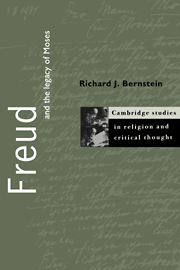Book contents
- Frontmatter
- Contents
- Preface
- List of abbreviations
- 1 The Egyptian origin of monotheism and the murder of Moses
- 2 Tradition, trauma, and the return of the repressed
- 3 Anti-Semitism, Christianity, and Judaism
- 4 “Dialogue” with Yerushalmi
- Appendix: an exchange of letters between Sigmund Freud and Lou Andreas-Salomé
- Notes
- Bibliography
- Index
Preface
Published online by Cambridge University Press: 15 December 2009
- Frontmatter
- Contents
- Preface
- List of abbreviations
- 1 The Egyptian origin of monotheism and the murder of Moses
- 2 Tradition, trauma, and the return of the repressed
- 3 Anti-Semitism, Christianity, and Judaism
- 4 “Dialogue” with Yerushalmi
- Appendix: an exchange of letters between Sigmund Freud and Lou Andreas-Salomé
- Notes
- Bibliography
- Index
Summary
Moses and Monotheism, the last book that Freud published, is one of his most difficult, perplexing, and thought-provoking works. Throughout his life Freud was deeply attracted to the figure of Moses. In his final years, he was literally obsessed with “the great man” Moses and his vexed legacy – a legacy that is rooted in the past, shapes the present, and extends its influence to the future. Freud was originally hesitant about publishing his Moses book, and there were those who pleaded with him to refrain from publishing it, or at least to modify some of his more shocking assertions. Writing on the eve of the Holocaust during the darkest period of Jewish history, Freud's emphatic claims that Moses was an Egyptian and that the Israelites murdered Moses in the wilderness are not only scandalous but appear to be without any solid historical foundation. Why would Freud even publish such a book? And yet, there is also a compelling grandeur about Freud's portrait of Moses and the monotheism that he professed.
When the book was first published in 1939, it provoked several polemical attacks. Even Freud's admirers were embarrassed by this awkward and confusing work. Because Freud's “arguments” were so manifestly outrageous, commentators tended to focus on the search for Freud's hidden or unconscious motives, what the book revealed about his personal conflicts, rather than on a careful analysis of what he actually says.
For many years I have returned over and over again to Freud's Moses study.
- Type
- Chapter
- Information
- Freud and the Legacy of Moses , pp. ix - xiPublisher: Cambridge University PressPrint publication year: 1998

